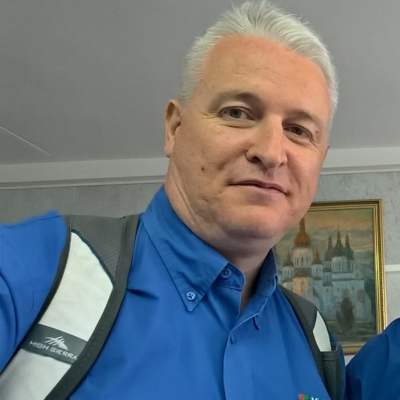Monday 9:00 AM - 5:00 PM · Room 343
A Comprehensive Guide to Direct Lake for the Pro Data Modeller
Join us for a workshop designed specifically for Pro Data Modellers. This comprehensive session will guide you through all the critical elements needed to build, tune, and maintain a Direct Lake Model in Microsoft Fabric.
Throughout the workshop, you will delve into essential topics such as: -Understanding the prerequisites for setting up your model. -Exploring the anatomy of Parquet files and their role in data storage. -Mastering transcoding and framing techniques to optimize data processing. -Implementing SQL fallback strategies for enhanced reliability. -Discovering new features and how they can benefit your projects. -Ensuring robust security measures to protect your data. -Fine-tuning performance to achieve optimal efficiency. -Navigating the migration process with ease. -Tackling advanced topics to elevate your modelling skills.
By the end of this workshop, you will have gained the knowledge and skills necessary to effectively manage a Direct Lake Model, ensuring your projects are both efficient and secure.
Monday 9:00 AM - 5:00 PM · Room 348
Introduction to Microsoft Fabric for the Data Professional
Join us for a full day of exploration into Microsoft Fabric, the revolutionary Software as a Service (SaaS) product that’s changing the game in Business Intelligence and Modern Analytics. For the last 3 years, Microsoft has been building this groundbreaking technology, which offers the ability to ingest and link to existing data without duplication. With Azure Synapse Data Engineering, Data Factory, Data Science, Data Warehousing, Realtime Analytics, and Power BI all at your fingertips, the possibilities are endless. In this pre-conference event, we’ll guide you through a full build scenario, showing you how to link existing data, and utilize OneLake. Join us and discover the power of Microsoft Fabric!
Tuesday 9:00 AM - 5:00 PM · Room 342
ETL, KQL, and RTI: Harnessing Data in Motion with Microsoft Fabric
Real-time Intelligence in Microsoft Fabric brings us into the next generation of data movement and event-driven architecture. As the arms race of cloud data platforms continues, make sure you know the weapons at your disposal so you and your company are fully equipped for the future - because the future is not far away. While you may be familiar with RTI’s streaming data capabilities, did you know it can be an integral part of your ETL architecture? While you may have heard of KQL, did you know it can do data visualization? While you may have heard of RTI, did you know it can help you monitor your entire data estate?
Join RTI product group members and Microsoft Data Platform MVPs for a full day of learning. Takeaways include:
- Loading a full medallion architecture using RTI components
- Use case by use case breakdown of the components of RTI and how customers are using them today across their data estate
- Data visualization and trend analysis with KQL
- Monitoring your entire data estate using Real-time Intelligence in Microsoft Fabric
Tuesday 9:00 AM - 5:00 PM · Room 343
Data Science Jump Start using Microsoft Fabric
Data scientists can manage data, notebooks, experiments, and models while easily accessing data from across the organization and collaborating with their fellow data professionals using Microsoft Fabric.
In this module, you'll learn how to understand the data science process in Fabric, train models with notebooks in Fabric and track model training metrics with MLflow and experiments.
Tuesday 1:30 PM - 5:00 PM · Room 340-341
Maximize efficiency in your data-driven projects by leveraging AI and Copilot technologies.
In the Total Economic Impact™ of Microsoft Fabric study, the composite organization based on data from four companies using Fabric showed an increase in data engineer and data scientist productivity of up to 50%, plus a 15% increase in business analyst productivity.
In this workshop, we will explore the transformative potential of various copilots, AI services within Microsoft Fabric. It covers live demos and hands on experience on Microsoft Fabric Copilots, AI Skills, Fabric integration with AI and GenAI services.
Participants will thoroughly explore the Copilot maturity framework and learn strategies to overcome adoption challenges, enabling customers to maximize the benefits of Copilots.
Wednesday 8:30 AM - 9:40 AM · Room 340-341
Microsoft Fabric: Ultimate Data Security for Robust Data Warehousing
This session delves into the advanced security features of Microsoft Fabric, specifically designed for data warehousing. Attendees will learn how to classify and protect sensitive data using sensitivity labels and policies in Microsoft Purview.
The session will cover the implementation of Row-Level Security (RLS) to restrict access at the row level, ensuring users only see data relevant to their roles. Additionally, it will explore Column-Level Security (CLS) to secure specific columns in datasets, providing an extra layer of protection for sensitive information.
Participants will also discover how to use data masking techniques to obfuscate sensitive data, making it unreadable to unauthorized users while maintaining usability for authorized personnel. The session will emphasize aligning data warehousing practices with regulatory requirements such as GDPR, HIPAA, and CCPA, leveraging Microsoft Fabric’s compliance tools and features.
Join us to gain a comprehensive understanding of how to secure your data warehouse end-to-end within Microsoft Fabric.
Wednesday 8:30 AM - 9:40 AM · Room 344
Microsoft Fabric: Lessons from Year 1
As of November 2023, Microsoft made the announcement that Microsoft Fabric was Generally Available. In the time since, many organizations jumped into the exciting world of this emerging technology.
Any fabric, technical or not, needs to be well maintained to retain its initial quality and usefulness. In the same way, your approach to implementing Microsoft Fabric could either set yourself up for a successful, long-term implementation, or one that needs a rebuild in 1-2 years.
In this session, I'll walk through features of Fabric that have lived up to the hyped labels and work as prescribed. I'll also provide demos challenges I've faced with the product and how I've worked through them. Finally, I'll recommend routine activities that should be performed on any Fabric environment to keep it nice and clean.
(If this wasn't enough Fabric references and you need more, check out this session for even more puns!)
Wednesday 8:30 AM - 9:40 AM · Room 345-346
Real-Time Intelligence: Turning Streaming Data into Smart Decisions
In today’s fast-paced world, making smart, data-driven decisions in real time is essential for maintaining efficiency and quality in business operations. Join us to explore Microsoft Fabric Real-Time Intelligence and discover how to seamlessly ingest, analyze, and act on real-time data. Learn how to:
- Ingest real-time data from multiple sources into Fabric
- Run lightning-fast queries for instant insights
- Monitor key metrics with intuitive, real-time dashboards
- Set up automated alerts and detect anomalies for proactive issue resolution
- Leverage Copilot in Real-Time Intelligence to query data using natural language
Wednesday 8:30 AM - 9:40 AM · Room 348
Infrastructure for Data Professionals: An Introduction
It doesn’t matter if you are a Junior DBA, an accidental DBA or all the way up to a Senior DBA, the infrastructure your SQL Server environment runs on is important. Many among the DBA community came in as developers or perhaps directly into database administration roles it is equally possible that you have been out of the operations world long enough to have fallen out of the loop with what is happening. This session is intended to provide a full stack infrastructure overview so that you can talk shop with your cohorts in operations to resolve issues and maybe even be proactive. We will discuss, in an introductory fashion, hardware, network, storage, virtualization and operating system layers. Additionally, some suggestions as to where to find more information will be provided.
Wednesday 8:30 AM - 9:40 AM · Room 437-439
Azure 101
Microsoft Azure is a daunting thing to look at and think about. In this session, we'll look at the basics of Azure, what the options are for setting up an Azure account; as well as look at how regions are broken down. We'll take a look at the differences between Infrastructure as a Service, Platform as a Service, and Software as a Service as well as the High Availability and Disaster Recovery options that are available to do with these services. We'll finish the session off by looking at some options for Virtual Machines within Azure as well as the SQL Server offerings that are available on the platform.
Wednesday 8:30 AM - 9:40 AM · Room 445-446
Copilot in Fabric - AI Data Science Help Tips and Tricks
Copilot and other generative AI features bring new ways to transform and analyze data, generate insights, and create visualizations and reports in Microsoft Fabric and Power BI. Come see how to take advantage of Copilot in Fabric, what it can do and how to make sure it's enabled.
Wednesday 10:20 AM - 11:30 AM · Room 320-321
Fabric Data Factory: What's New and Roadmap
In this session, you will learn the exciting product innovations and roadmap for Fabric Data Factory. You will learn how Fabric Data Factory provides industry-leading data movement, transformation and orchestration capabilities. You will learn how AI-powered development experiences will enable you to be more productive and effectively build data integration solutions.
Wednesday 10:20 AM - 11:30 AM · Room 342
Accelerate Intelligent App Development with SQL Database in Microsoft Fabric
Discover the new SQL database in Microsoft Fabric, where seamless setup and an integrated development environment enable you to quickly leverage the power of an AI-driven data platform. Provision and deploy an autonomous database with built-in security in seconds, featuring automatic setup. In this session, we'll delve into the potential of SQL database in Fabric, which combines the enterprise-scale features and capabilities of the Azure SQL Database engine with the autonomous management and ease-of-use advantages of the Microsoft Fabric data estate. We'll uncover core functionalities, best practices, and real-world strategies to integrate your database with other Fabric workloads, creating a tailored, high-impact data stack that empowers your solutions to thrive within the Fabric ecosystem.
Wednesday 10:20 AM - 11:30 AM · Room 343
Introduction to SQL Server Essential Concepts
When I first started learning about SQL Server, really deeply learning, there were a few “key” concepts that you hear repeated often by top speakers and SQL MVP’s. Internals, recovery models, and backups. They are interconnected. As the learning continued, it was self-evident how understanding basic data internals with pages, extents, and allocation bitmaps or database recovery models, the transaction log, and VLF’s or advanced backup options backups like stripping and piecemeal restores affected the uses of SQL Server. They affected not just SQL Server but the way you make decisions in order to determine how best to use SQL Server to support your business. This session enables you to have that core set of understanding required for advanced SQL learning.
Wednesday 10:20 AM - 11:30 AM · Room 344
Deep dive into Direct Lake
Join Patrick Leblanc and Phil Seamark for a deeper dive to discover what makes Direct Lake so fast. This session will cover important elements of monitoring and optimizing your Fabric data platform to unlock the full potential of Direct Lake, such as how to interpret Delta Analyzer logs and what to look out for if things slow down.
Wednesday 10:20 AM - 11:30 AM · Room 348
Getting started with SQL database in Fabric
Microsoft Fabric, the unified data platform, now includes an operational database solution and it is SQL! Come learn all the fundamentals of how this solution is the same and different from other SQL deployment options. We will also show you the value of using SQL in the Fabric ecosystem including developer experiences, automation, monitoring, and integration for AI applications.
Wednesday 2:00 PM - 3:10 PM · Room 320-321
Building a framework for orchestration in Azure Data Factory
Finding the balance between cost, efficiency and performance for cloud-based ETL processes can be a tricky proposition, and a good ETL framework will help you get there.
In this session we will look at what the components of such a framework may look like in Azure Data Factory, and why orchestration can be a good option if you're trying to minimize cost. We will also walk through an actual framework I've developed and use today, which you can use as a starting point for your own efforts.
If you are currently using Azure Data Factory and feel like you're recreating the wheel all the time, or if you're planning to move from SSIS to ADF in the future and would like some ideas on how to create an ETL framework, this will be the perfect session for you.
Wednesday 2:00 PM - 3:10 PM · Room 342
Build an end-to-end data solution with Microsoft Fabric
In this session, we will explore how to leverage Microsoft Fabric to create an end-to-end data solution. From leveraging Data Factory for data movement and orchestration, Notebooks to assist with data cleansing and further transformation, along with various engines such as Lakehouse and Power BI to complete the story. We look at how to get your data, get it into a usable form and possibly even reusing that data without having to copy with the end goal of providing reports and visualizations. We'll also look at other benefits where you can leverage the data for a complete solution.
Wednesday 2:00 PM - 3:10 PM · Room 344
PowerBI, DirectQuery and SQL Server. It is a good choice?
You will learn best practices, tips and tricks on how to successfully use SQL databases (OnPremise,IaaS, PaaS,SQL Managed Instance) with PowerBI on production environments.
How improve the performance, using for example, Read-Scale, HyperScale or Synapse, partitioning, ColumnStoreIndexes, Indexed views, etc..
How to monitor and diagnostic your database and find out issues with Query Data Store. These learnings are fruit of Microsoft CSS support cases, and customer field engagements.
Wednesday 2:00 PM - 3:10 PM · Room 348
Transform your business with integrated solutions using SQL database in Microsoft Fabric
The promise of SQL Database in Fabric is that it is simple, autonomous, and optimized for AI - but what does that mean for you and your organization? In this session we will explore how various personas can benefit from a deeply integrated operational database in Fabric. Discover how customers are using SQL Database in Microsoft Fabric today, and how Fabric databases can help you build innovative solutions in the age of AI, faster and easier than ever.
Wednesday 4:00 PM - 5:10 PM · Room 320-321
Everything you need to know about Data Virtualization in Azure SQL Database
Learn everything you need to know about Data Virtualization, OPENROWSET, External tables, parquet, Delta, best practices, how to access external data using Azure SQL Database, export cold data, and create your very own data tiering solution.
Wednesday 4:00 PM - 5:10 PM · Room 342
Fabric houses, when to go for Lakehouse or Warehouse (or both)?
Should you keep your data in the Fabric Lakehouse or the Warehouse? What are the pros and cons? In Fabric, all and any data is kept in the OneLake, and it is processed by one of the Fabric’s data engines. Choosing between Lakehouse and Warehouse (or both) is at the same time a strategic and performance impacting decision. • In this demo oriented session you will learn: o Their distinctions and particular use cases o When they overlap o How to use them together o When not to use one of them (or either)
Wednesday 4:00 PM - 5:10 PM · Room 340-341
Skills to Pay The Bills: Using AI Skills in Fabric
Have you struggled with the wide variety of ways to implement AI in and around your data? Which API to call? Which model to deploy? Where do I go for help? Did you know there are built-in AI skills in Microsoft Fabric that provide a single place for you to utilize AI in and around your Fabric data? Join me for this demo-rich 1-hour session as we learn about what AI skills can do for your data in Microsoft Fabric - and for you!
Wednesday 4:00 PM - 5:10 PM · Room 344
Data Governance with Microsoft Purview and Microsoft Fabric
Managing data across large organizations can feel like an endless game of catch-up. Microsoft Purview and Fabric make it easier by giving teams tools to organize, protect, and share data without constant compliance headaches.
First, we’ll look at the challenges organizations face when data is scattered across silos with possible security gaps slowing everything down and creating possible regulatory concerns.
Next, we’ll see how Purview and Fabric work together to streamline data management by cataloging assets, enforcing protections, and making data easier to find.
Finally, we’ll show how this approach simplifies compliance, improves data accessibility, and supports better collaboration across teams.
Attendees will come away with a practical guide on using Microsoft Purview and Fabric to keep data organized, compliant, and useful.
Wednesday 4:00 PM - 5:10 PM · Room 347
Worst code ever! Reviewing real-world examples that mandated refactoring.
This session looks at SQL Code that couldn't be tuned without a rewrite, working through why it was bad, why the optimizer couldn't deal with it appropriately, and what needed to be done to fix it.
Thursday 8:30 AM - 9:40 AM · Room 342
Oracle/SQL to Fabric Migration accelerator
This session explores a streamlined approach to ingesting data from Oracle and SQL databases into Microsoft Fabric’s OneLake using an QMigrator our in-house built data migration product. The session would focus on how to automate data extraction, transformation, and ingestion while ensuring data integrity and governance. QMigrator provides a structured process to transform the data into Fabric one lake format. Key takeaways include schema mapping, automated monitoring, and cost-efficient scalability. Attendees will get a detailed overview about QMigrator in setting up pipelines, handling incremental loads, and enabling self-service analytics using Fabric’s integrated ecosystem.
Thursday 8:30 AM - 9:40 AM · Room 340-341
Real Time Monitoring with Real-life Use Cases using Database Watcher
In this session, we are going to show you how easy it is to use Database Watcher, a cloud-native and cross-platform solution that supports multiple database types, versions, and platforms, to set up proactive database monitoring and collect deep and rich data. You will see how Database Watcher provides easy to understand visualizations, with near real time monitoring, which can help you optimize your database performance, availability, and health.
During this session we will cover the following with you:
- Brief overview of Database Watcher architecture
- Delve into real scenarios with Database Watcher dashboards
- Create custom dashboards for custom scenarios
- Using the power of KQL to query the raw monitoring data
Join us in this session and discover how Database Watcher can help you take your DBA career to the next level by enabling you to proactively monitor, troubleshoot, and improve your database operations.
Thursday 8:30 AM - 9:40 AM · Room 345-346
Harness the Power of Microsoft Fabric and Notebooks
Microsoft Fabric gives us a notebook experience unlike any other previous Microsoft product. The power of notebooks is immense. Sure you can use data from your Lakehouse, Data Warehouse, or OneLake but what about PYODBC? Can we connect to a relational database without a Data Pipeline or a Data Flow? Could we just download a file from Kaggle or Github and start using Data Wrangler? Could we use Beautiful Soup to scrape data, load it into a Pandas data frame, and begin working with it? Can we invoke OpenAI models using GPT to glean new insights into our data? Yes, Yes, Yes, Yes, and Yes. Yes we can, and in this session you will learn how to harness the power of Microsoft Fabric Notebooks.
Thursday 10:20 AM - 11:30 AM · Room 320-321
SQL Server and AI, tomorrow has arrived
Applications in need of modernization and integration with AI usually pick up an AI broker to bridge the gap. Microsoft SQL Server 2025, still in private preview, as announced interesting features to implement this bridge and help developers to get AI results in existing applications faster. In this session will you learn about these features and how they will help infuse AI in current apps.
Thursday 10:20 AM - 11:30 AM · Room 340-341
How to Pitch Fabric to your Leadership
While executives are familiar with Power BI's impact on business intelligence, many remain unaware of how Microsoft Fabric revolutionizes the entire data value chain. This session bridges that knowledge gap, equipping data leaders with practical strategies to transform Fabric from "just another BI tool" into a compelling platform for enterprise-wide data transformation. Learn how to build a clear, staged roadmap that starts with familiar Power BI territory and progressively demonstrates Fabric's game-changing capabilities in data integration, lakehouse architecture, and real-time analytics. Through real-world case studies, you'll see how leading organizations have successfully expanded from departmental BI to enterprise-wide data transformation using Fabric's unified platform. We'll explore how to identify and prioritize quick wins that build momentum while laying the foundation for broader adoption. You'll learn effective techniques for quantifying ROI at each stage of implementation, addressing security and governance concerns, and managing organizational change from your existing data stack to Fabric's modern architecture. Whether you're just starting to evaluate Fabric or looking to accelerate adoption, you'll leave with a practical blueprint for moving your organization beyond Power BI into the full potential of Microsoft's unified data platform.
Thursday 10:20 AM - 11:30 AM · Room 342
Revolutionizing Data in Motion w/ Real-Time Intelligence in Microsoft Fabric
If you work with data, you're generally dealing with two types of data: data in motion and data at rest. While we have many time-tested solutions for dealing with our data at rest, it hasn't been simple or straightforward to deal with data in motion - yet.
Real-Time Intelligence in Microsoft Fabric opens the door to some truly innovative, low-code approaches to dealing with your data in motion, whether that data is in ETL processes, streaming data, or something else entirely. Join me for this hands-on walkthrough to RTI - what it is, what it isn't, and what it can do for you.
Thursday 10:20 AM - 11:30 AM · Room 347
Hold my beer; I know how to fix this with Copilot!

Hasan Savran
Microsoft MVP, Owner of SavranWeb ConsultingS, Sr. Business Intelligence Manager at Progressive Insurance
Many proof-of-concept AI applications fail to reach production because industries do not find value in copilot-like applications. Companies seek clarity and focus, not an overwhelming barrage of chat applications bombarding decision-makers with countless suggestions or summarizations. This session will help you connect the dots in the AI puzzle using Microsoft technologies, including the new open-source database, DocumentDB. We will examine vector stores, the RAG pattern, and multi-agent frameworks and learn how to implement these technologies in applications. By the end of this session, you will have all the practical information necessary to integrate AI features into your projects.
Thursday 10:20 AM - 11:30 AM · Room 348
10 Free SQL Databases: Your Playground for AI, Advanced Analytics, and Next-Gen Applications!
The Azure SQL free database offer is bigger than ever—now providing 10 free databases per subscription for life! This means unlimited opportunities to build, analyze, and innovate without worrying about costs.
In this session, you'll explore how to:
- Unlock AI-driven insights by running ML models, anomaly detection, and intelligent recommendations directly in SQL 2.Power real-time analytics by processing and visualizing data streams for predictive forecasting and decision-making 3.Automate workflows and optimize data pipelines with SQL-based automation and event-driven processing 4.Enhance BI reporting and dashboarding with seamless integrations into Power BI and other analytics tools 5.Develop enterprise-grade applications, including AI-powered customer insights, fraud detection, financial forecasting, IoT telemetry, and marketing personalization 6.Set up multi-database environments for development, experimentation, and CI/CD pipelines—all without affecting production
Whether you're a developer, data scientist, or analytics enthusiast, this session will show you how to harness the full power of SQL for AI and analytics—with zero cost and limitless possibilities.
Join us and take your data-driven applications to the next level!
Thursday 12:40 PM - 1:50 PM · Room 320-321
Choosing the Right Data Store--An Overview of Azure Data Platform Choices
There are several different data platform solutions for use within your application. Selecting the right option can make the difference between a well-performing application and a poorly performing one; not to mention the cost aspect of choosing the wrong solution.
In this session we'll look at the options of Azure SQL Database, Azure SQL Database Managed Instance, and Cosmos DB to see when these are all going to be the correct option, and when these aren't going to be the right option; both from a price and performance perspective.
Thursday 12:40 PM - 1:50 PM · Room 340-341
Best practices and Guidance when using Microsoft Dataverse
We'll cover best practices when developing solutions using Microsoft Dataverse. We'll cover guidance for API usage, form design, app performance, security, maintenance and more!
Thursday 12:40 PM - 1:50 PM · Room 342
Transform Your Business with Real-Time Intelligence: Microsoft Fabric Meets Dynamics 365
Abstract: Imagine your Dynamics 365 data not just as a record-keeping system, but as a live, actionable resource driving real-time decisions across your organization. In this session, we’ll dive deep into how Microsoft Fabric enhances Dynamics 365 with real-time intelligence, enabling you to unlock new opportunities for operational efficiency and innovation. We’ll start by demonstrating how to implement event sourcing to capture and process changes in Dynamics 365 in a real time fashion way, integrating into Microsoft Fabric’s powerful analytics and data integration capabilities. Using real client success stories, you’ll see how these patterns enable instant updates, real-time reporting, and proactive decision-making. You’ll also experience live demos showcasing the full lifecycle of real-time data integration—from capturing events in Dynamics 365 and transforming them in Fabric pipelines, to visualizing actionable insights in Power BI and bringing them back into Dataverse to empower your teams.
In this session you will learn how event sourcing and modern integration patterns bring data to life, through real client success stories and live demos.
What You’ll Learn:
• How to set up real-time data pipelines between Dynamics 365 and Microsoft Fabric.
• Practical event-sourcing patterns for building seamless, scalable integrations.
• Techniques to surface actionable insights back into Dynamics 365 and Dataverse to empower decision-making.
• Best practices for operationalizing real-time intelligence with minimal disruption to your existing architecture.
Why Attend:
You’ll leave this session with a step-by-step understanding of how to create real-time intelligence solutions, backed by practical examples and real-world use cases. Whether you're a data professional, architect, or Dynamics 365 expert, this session will give you actionable tools and insights to take back to your organization.
Post-Session Outcomes:
• Start building your first real-time integration using Microsoft Fabric and Dynamics 365.
• Access resources, templates, and best practices shared during the session to accelerate your implementation.
• Connect with like-minded professionals to collaborate and share ideas.
Call to Action:
Don’t just learn—act! After the session, you’ll be encouraged to apply what you’ve seen, with resources and next steps to kickstart your real-time intelligence journey. Let’s turn your data into a strategic advantage!
Thursday 12:40 PM - 1:50 PM · Room 343
A Query Runs Through It: An Introduction to the SQL Server Engine
Have you ever wondered what happens inside SQL Server when you execute that query you wrote? This session will serve as an introduction to what is going on under the hood, commonly called SQL Server Internals. Whether writing queries or tuning them, SQL Server internals knowledge is highly valuable in Azure VMs or SQL DB, AWS, GCP, and on-premises as the SQL Server engine is the same. Together we will dip into why data types matter, ponder pages, sample the storage engine, and ponder the query processor as we see what happens when your query runs.
Thursday 12:40 PM - 1:50 PM · Room 344
Power BI Storage Modes: The Ultimate Showdown
Power BI offers three different storage modes for data: Direct Query, Import and Direct Lake. Each of them has its own advantages and disadvantages, depending on the scenario and the requirements. But which one is the best overall? How do they compare in terms of performance, scalability, flexibility and ease of use?
In this session, we will put the three storage modes to the test in a series of challenges inspired by the Olympic Pentathlon. We will use real-world data sets and scenarios to measure how each storage mode handles different aspects of data analysis and visualization. We will also share some best practices and tips on how to choose the right storage mode for your project.
By the end of this session, you will have a better understanding of the strengths and weaknesses of each storage mode, and you will be able to decide which one deserves the gold medal in your Power BI dashboard.
Thursday 12:40 PM - 1:50 PM · Room 345-346
Top 10 SQL Server tuning tricks you can use today.
This will include easy tricks like using the DMV to identify missing & duplicate indexes, but also many subtle tricks we've identified over time to fix issues at our 60+ customer sites.
Thursday 12:40 PM - 1:50 PM · Room 347
AI and SQL ground to cloud to fabric
New to AI? Come learn the fundamentals of how to get started with AI and Microsoft SQL everywhere it exists: ground to cloud to fabric. This includes SQL Server 2025, Azure SQL, and SQL database in Fabric. SQL is the perfect place to integrate data with AI because of its industry proven security, scalability, and availability. We will show GenAI capabilities like vector search, how to integrate these with your application, and Copilot experiences everywhere SQL exists including GitHub Copilot.
Thursday 12:40 PM - 1:50 PM · Room 348
Azure SQL DB Hyperscale: The Definitive Modern Database Choice
Join us at DataCon to explore the Azure SQL Database Hyperscale. We'll discuss its architecture and use cases, highlighting benefits like larger database sizes, faster throughput, and continuous priming. Learn how these advancements boost scalability, speed, and reliability in data management. Stay ahead with the cutting-edge features of Azure SQL Database Hyperscale. We'll dive into real-world use cases and innovations that demonstrate the power of Azure SQL in driving the next generation of databases. Discover how organizations are leveraging Hyperscale for mission-critical applications, and how vector support enhances performance for complex queries and AI workloads. Experience firsthand the transformative impact of Azure SQL Database in various industries and understand why it is the preferred choice for modern data solutions.
Thursday 2:00 PM - 3:10 PM · Room 342
Data Processing Architecture: Key Design Principles & Considerations
In the era of big data, the design of data processing architecture is crucial for efficient data management and analysis. This presentation explores the fundamental principles and considerations essential for constructing robust data processing systems. Key design principles such as scalability, reliability, security, and flexibility are examined in detail.
The architecture's ability to handle varying data flows, ensure data integrity, and maintain security across multiple stages is emphasized. Additionally, the presentation discusses various architectural patterns, including data warehouses, data lakes, and data flow pipelines, highlighting their respective use cases and benefits.
Furthermore, the presentation contrasts traditional data processing architecture with the emerging concept of data mesh. While traditional architectures focus on centralized data processing and transformation, data mesh advocates for a decentralized approach, promoting domain-oriented data ownership and self-serve data infrastructure.
This comparison underscores the shift from monolithic data management to a more flexible and scalable architecture, addressing the diverse needs of modern data-driven organizations.
By adhering to these principles and considerations, data engineers can create systems that not only meet current data processing needs but are also adaptable to future technological advancements and data requirements.
Thursday 2:00 PM - 3:10 PM · Room 340-341
Working with OAuth 2.0 APIs in Azure Data Factory
Working with APIs can be tricky, and even more so when it's an OAuth 2.0 API. Add to that an ETL platform and automation, and you now have a perfect storm that's pretty difficult to navigate.
This session is about my journey with OAuth 2.0 APIs while trying to extract my own financial data, how I struggled with the authorization flow and how it finally started making sense.
We'll talk about what an OAuth 2.0 API is, and why they are so difficult to deal with when your tool of choice is an automated ETL platform. After that we'll take a closer look at the steps to develop an ADF pipeline that extracts data from an OAuth 2.0 API, and review some tools that can help you throughout the development process.
Thursday 2:00 PM - 3:10 PM · Room 347
Unified DevOps for Microsoft Fabric, Azure SQL, and SQL Server with next-gen SQL projects
With Microsoft.Build.Sql SDK-style SQL projects, your database objects are stored as code for seamless development in Microsoft Fabric and client tools like VS Code and Visual Studio, but the advantages don’t stop there. The modernized SQL projects format backs Fabric’s git integration and deployment pipelines for Data Warehouse and SQL database, providing interoperability with extended CI/CD capabilities and your existing DevOps investments for SQL Server, Azure SQL Database, and Synapse Data Warehouse. SQL project’s code analysis and other build-time tests validate database code quality and correctness during continuous integration of code changes. With SQL projects delivering database object updates is easier and more reliable whether you're managing one database or a fleet of databases because the deployment plan is dynamically calculated through the SqlPackage CLI. In this session we’ll learn how to leverage the Fabric experiences for database DevOps in addition to the depth of capabilities from SQL projects such that we can efficiently develop and deploy database changes with source control integration, all with the tools you love.
Thursday 4:00 PM - 5:10 PM · Room 342
Indexing for Performance
What does the optimizer actually do with an index, what do the index structures look like, and what can e do to optimize index performance? This session covers index internals and optimizer limitations
Thursday 4:00 PM - 5:10 PM · Room 343
SQL Server 2025: The Enterprise AI ready database
Come learn about the latest information for SQL Server 2025, now in preview. You will learn how to bring AI to your data with AI applications using built-in vector capabilities ground to cloud. In addition, you will learn about new enhancements for developers including JSON, RegEx, REST API, GraphQL, Change Streaming. You will also learn about all the new engine features for security, performance, and availability. You will also see how to integrate your SQL Server 2025 experience using the new SSMS21 and SSMS Copilot.
Thursday 4:00 PM - 5:10 PM · Room 344
SSMS 21 Spotlight: What's new and why it matters
With the Preview 1 release of SQL Server Management Studio (SSMS) 21 in November, the SQL Tools team made available the biggest set of updates to SSMS in recent memory, including numerous requests that customers have been waiting to see...for years in some cases.
In this session we'll show off what's new in SSMS 21, what's in progress, and what we have planned for SQL 2025. We'll start by walking through installation and jump to the first step for each launch - connecting. You'll want to connect to a database using our new connection dialog - we'll take a tour through the experience and take feedback (we're always listening :) We'll also cover updates you'll find throughout SSMS such as changes to Azure authentication, and improvements in the query editor and results grid. Folks have been excited about support for Git in SSMS, so we'll show you how to get started. If Git is new to you, it may seem daunting. Don't worry, if we can figure it out, so can you!
Expect lots of demos, as many tips, tricks, and updates as we can fit in.
Friday 9:00 AM - 10:10 AM · Room 320-321
Azure SQL Database Hyperscale elastic pools - a deep-dive
Azure SQL Database offers a very popular deployment option called elastic pools, to help ease the challenges around right-sizing and cost-optimizing resources for a group of databases. In this session, we will dive deep into the latest generation of elastic pools which leverage the Hyperscale cloud-native architecture. Starting with a quick overview of the motivation for using elastic pools, and a quick recap of the Hyperscale tech, we will use demos to show you:
- How Hyperscale elastic pools ("HSEP") implement resource sharing...
- ... while maintaining strong isolation between databases - What are the performance and capacity limits of each HSEP
- How you can proactively control "noisy neighbor" databases in a HSEP
- How HSEP scales vertically and / or horizontally, and what the impact of such scaling is on your workloads
- How to monitor HSEP effectively using DMVs, Azure Monitor and Database Watcher
- How backups, high availability, and disaster recovery work for databases in a HSEP
- Last but not the least, how HSEP helps in cost optimization - and what you should watch out for as well to manage TCO.
To make best use of this session, some Azure SQL knowledge would help, but it's not necessary. Anyone who plans to run databases in Azure SQL should be aware of elastic pools so that they can benefit from the optimizations they provide. This session will directly help you in understanding how HSEP work and how they may be beneficial to your scenario.
Friday 9:00 AM - 10:10 AM · Room 342
Building a Data Culture
Data is a core part of our lives that influences all parts of business, from how we implement technology, to our establishment of business processes, all the way to individuals themselves. We solve tech and business process problems every day, but do we solve people problems?
How are people problems solved? With company culture. And culture can make or break data projects as easily as tech and process problems.
In this session, we'll talk about a company culture's influence on their ability to be data driven. We will identify common pitfalls that can influence how well your organization will be able to use data. We will also identify ways you can identify, and even measure, the data culture in your organization.
Friday 9:00 AM - 10:10 AM · Room 344
Supercharge your analytics with Microsoft Fabric Real Time Intelligence
For many years, data has been primarily batch loaded from sources on fixed schedules, resulting in operational challenges, outdated data, and delayed insights. The introduction of Lambda architecture aimed to mitigate these issues by accelerating some data processing. Now, with Microsoft Real Time Intelligence, we can easily enhance analytics architecture to easily integrate "hot-path" approaches to make data available faster. In this instructional session, we will explore how to integrate event sourcing and other microservices patterns to achieve real-time data integration using Microsoft Fabric. Attendees will learn practical techniques and best practices for implementing these patterns to ensure seamless and efficient data flow.
Friday 10:20 AM - 11:30 AM · Room 320-321
Make your solution sparkle with the medallion architecture
As a data engineer you spend a lot of time transforming data into data models that in turn will be used to provide insights to your organization. As the lines between the technical and business roles become more and more blurred it is even more important to establish a solid data architecture.
In this session we will demystify the medallion architecture and its different layers. We will showcase how you can use it in your solutions like Azure Databricks or Microsoft Fabric as well as digging into the benefits of using a non-technical approach when collaboration between different data roles increases even more.
If you are a data engineer, a data analyst, a business analyst or a business representative consuming analytical data, this session is for you. You will by the end of this session identify how your data flows through the layers of the medallion architecture and what data to use for different use cases.
Friday 10:20 AM - 11:30 AM · Room 340-341
Securing Azure PaaS Network Communications
Many companies use one or more Platform as a Service (PaaS) offerings when working with Microsoft Azure. However, these companies don't want to allow the network traffic to these PaaS services to go over the public Internet. In this session, we will learn more about why companies want to secure this network traffic and, more importantly, how to secure this traffic and what application changes need to be made to use these private connections.
Friday 10:20 AM - 11:30 AM · Room 343
Performance tuning for Azure Cosmos DB

Hasan Savran
Microsoft MVP, Owner of SavranWeb ConsultingS, Sr. Business Intelligence Manager at Progressive Insurance
Azure Cosmos DB is a fully managed database service, freeing developers from database management tasks. However, as a developer, you still have important responsibilities, such as changing indexing policies, configuring connections, estimating workloads, and selecting the right throughput options. All of these tasks have a direct impact on the performance and cost of your application. To keep your application running smoothly and fast, we'll explore the .NET/SDK settings, connection types, and indexing types. We'll also focus on selecting the right throughput options, using Query Execution Metrics and server-side programming. Join me as we explore how to optimize your Azure Cosmos DB solutions for the best performance.
Friday 10:20 AM - 11:30 AM · Room 344
Harnessing the Power of Data Mesh: A Deep Dive into the Four Pillars of Modern Data Architecture
Abstract: In today's data-driven world, traditional data management approaches often struggle to keep pace with the growing complexity and scale of enterprise data. Enter Data Mesh, a revolutionary paradigm that redefines how organizations handle data. This session will explore the four foundational pillars of Data Mesh architecture: Domain-Oriented Decentralization, Data as a Product, Self-Serve Data Infrastructure, and Federated Computational Governance.
We'll delve into how Domain-Oriented Decentralization empowers teams to own and manage their data, fostering agility and innovation. Discover the concept of Data as a Product, where data is treated with the same rigor and care as any other product, ensuring quality and usability. Learn about Self-Serve Data Infrastructure, which democratizes data access and tooling, enabling teams to work independently and efficiently. Finally, understand the importance of Federated Computational Governance in maintaining security, compliance, and consistency across decentralized data environments.
Join us to gain insights into implementing Data Mesh in your organization, transforming your data strategy, and unlocking the full potential of your data assets.
Friday 10:20 AM - 11:30 AM · Room 347
Unleash the Power of SQL Database in Fabric: Innovate Without Limits Using the Free Trial
Curious about SQL Database in Fabric but unsure where to start? This session is your gateway to limitless innovation—completely free. Discover how to leverage the Fabric free trial to explore serverless computing, real-time analytics, and AI-powered insights—all without cost or commitment.
We’ll walk you through hands-on scenarios, best practices, and real-world workflows that showcase the full potential of SQL Database in Fabric. Learn how to automate processes, optimize performance, and seamlessly integrate SQL with other Fabric components to drive efficiency and scale effortlessly.
Whether you're a developer, data engineer, or tech innovator, this session will give you the tools to experiment, build, and unlock new capabilities—risk-free. Don't miss this opportunity to transform your data solutions and bring your ideas to life with zero barriers, zero cost, and endless possibilities.
Friday 10:20 AM - 11:30 AM · Room 348
Microsoft Database Docs - Learn about Contributing for your Career
Join content developers from the Microsoft Database Docs content team for an interactive discussion and call to action on modern Microsoft docs. Learn about the Docs publishing process in GitHub, and the best ways to add content and fixes to Docs that are read by the entire customer community. We'll also ask for your feedback on Docs and host Q&A. Learn what contribution to Microsoft Learn can mean for your Microsoft MVP status, your career, or your personal brand.
Friday 12:30 PM - 1:40 PM · Room 342
Mastering Elastic Database Pools: Best Practices and Troubleshooting from Microsoft Support
Join us for an in-depth exploration of Elastic Database Pools, the game-changing technology that empowers developers and DBAs to efficiently manage and scale their databases. In this session, we'll delve into best practices and strategies for leveraging Elastic Database Pools to optimize your workload management and improve performance. Drawing from real-world support cases at Microsoft, we'll demonstrate the significant impact and benefits of using Elastic Database Pools in various scenarios. Our talk will also cover essential troubleshooting techniques to identify and resolve incidents effectively. Plus, don't miss our live demos showcasing practical examples and code in multiple programming languages. Whether you're a seasoned developer or a DBA looking to enhance your toolkit, this session is tailored for you! Gain valuable insights, practical tips.
Friday 12:30 PM - 1:40 PM · Room 344
Build a Robust App with Fabric SQL Database, GraphQL API, and User Data Functions
Discover how to harness the full potential of Fabric to build powerful modern data-driven applications. In this session participants will learn how to use the API for GraphQL and User Data Functions over SQL databases and other data sources in the Microsoft Fabric Platform to build modern “CRUD” (Create, Read Update and Delete) data APIs that you can immediately call from an application. APIs for GraphQL enable you to effortlessly connect your Fabric data with your applications, with only a few clicks. If you have more complex business logic for your data, you can implement it with Python User Data Functions. With these two powerful building blocks and a SaaS-ified, developer-friendly experience, your app will be up and running in no time!
Friday 12:30 PM - 1:40 PM · Room 347
Build AI Apps Smarter: Optimize SQL Database Costs & Performance in Fabric
Take your AI apps to the next level with cost-smart SQL database optimization in Fabric. This session explores how to maximize performance while minimizing costs by leveraging Fabric's capacity monitoring tools for SQL databases. Learn to track resource usage, identify inefficiencies, and optimize database performance—all without exceeding your budget. Designed for app developers, architects, and innovators, this talk will provide real-world strategies to build scalable, high-performing AI apps powered by intelligent SQL database cost management. Discover how to turn insights into action and supercharge your AI applications with Fabric
Friday 12:30 PM - 1:40 PM · Room 348
Unleashing Modern Data Warehousing: Architecture, Insights & Future Innovations in Fabric Warehouse
Join us for a deep dive into the modern data warehouse! We’ll break down the core principles, use cases, and architectural intricacies. Discover how innovations like Data Virtualization, enhanced Data Modeling experiences, AI-powered insights with Copilot, and more are helping developers and customers unlock the full potential of Fabric Warehouse. This session is packed with live demos, best practices, and an exciting glimpse into the future roadmap of Data Warehousing.
Friday 1:50 PM - 3:00 PM · Room 342
Ingesting REST API data with Microsoft Fabric
If you are like many, the process to ingest REST APIs into a warehouse can be a mess. However, if you are a citizen developer in your organization, you likely did not have an opportunity to even attempt this in the past. Enter Microsoft Fabric and a suite of data engineering tools to help you accomplish your goals!
In this session, you will learn how you can take data that is available to you today within Microsoft Graph and quickly deploy it for your own internal use. We will go through the architecture required to build out the solution, steps to implement it, and even connect to a report to show the final product. While Microsoft Graph may not be a data source you care about, it is available to all Microsoft customers and provides enough challenges to help you get to your desired end state. Regardless of your experience with Fabric, this will be an easy session to follow!
By the end of this session, you will understand the basic components of Microsoft Fabric and how to implement this solution within your organization!
Friday 1:50 PM - 3:00 PM · Room 343
Wait Wait Do Tell Me: A Look At SQL Server Wait Stats
Hurry up and wait, it happens to all of us, even SQL Server. Why is SQL Server waiting? What can we do about it? These questions will be addressed as we define what a wait really is in SQL Server and some approaches to make SQL wait less. This session, targeted at data professionals, managers, developers, and sys admins, will also explore a few of the common SQL waits and specifically what we can do about them
Friday 1:50 PM - 3:00 PM · Room 344
Mirroring in Microsoft Fabric - Overview and Roadmap
Microsoft Fabric accelerates data potential for the era for AI. Mirroring simplifies linking of external databases into Fabric, with full replicas created with just a couple of clicks. Once a database is mirrored, real-time updates will automatically be replicated into OneLake and stored as Delta Parquet, an analytics-ready format that works seamlessly for every analytics workload in Fabric. Join us to gain deeper insights and learn how to get started with Mirroring by bringing data gravity to unlock powerful insights in Fabric.


















































